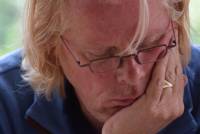Machiel Roest (1960)
As a young boy I spent most of my Saturdays with my grandfather in Pulchri Studio. This is where my interest in art was born and where I encountered a kind of "dream-world that made me feel great". Art gave me a feeling of freedom, a freedom which I’ve always been searching for and which I finally found in philosophy and painting.
My grandfather Machiel ("Mac") Roest (1889 - 1973), was a well-known personality in the art world in The Hague and an honorary member of Pulchri Studio. His friends; Willem Hussem, Sierk Schroeder, Jan van Heel and Co Westerik introduced him to The Hague Art world of the 1930s-1960s. My parents had a passion for art which they passed down to me.
During High school I spent time studying philosophy and discovered the work of Ludwig von Wittgenstein. After reading the Tractatus Logico Philosophicus, I realized that philosophical problems were limited by language and not by thinking itself. Reading the Tractatus in German, English, French and Dutch gave the impression of reading four different works. The interpretations of the various translators did not, in my eyes, really reflect what Wittgenstein meant to say.
The works of Friedrich Nietzsche, Hannah Arendt, Martin Heidegger and Arthur Schopenhauer have been an important inspiration in my life. Gradually their thinking became part of my life. I became "obsessed", searching society to find examples of their thinking. What philosophical concepts could I observe in our society? And if I could not find any - was there a sense to philosophy?!
After a short study of economics, I ended up as a stock broker in the financial world. Great successes, big setbacks and not feeling at home in the world of finance were the reasons why I experienced severe depression in the mid-1990s. During this period, I realized that using language in reading, thinking about, and the studying of the works of great philosophers is only a limited one-sided form of philosophy. In other words, it is not that someone who studies philosophy is a philosopher. It is not that if you literally can repeat philosophical theories, that you are a philosopher. You are a philosopher by nature or you are not.
In 2009, I started drawing and painting what Wittgenstein's philosophy meant to me. The need arose for me to translate his aphoristic, numbered and mathematically-oriented propositions into my “drawn reality”. I wanted to express my interpretation of his philosophy (his Tractatus) through the universal language of art rather than with words. This series consists of 65 paintings, each one relates to one part, one aphorism, of the Tractatus.
The paintings are painted on paper, because philosophy is written and printed on paper. The seams between the sheets of paper show the duality of life. Nothing is fluent; there is always a boundary but this time without the boundary of language.
I have called this series:
Machiel meets Ludwig von Wittgenstein
(1975 - 2018).
